状语从句——原因和目的状语从句 教案
状语从句全类型讲解教案

状语从句全类型讲解教案一、引言。
状语从句是复合句的一种,用来修饰主句,表示时间、原因、条件、让步、目的等不同的关系。
状语从句的类型有很多,包括时间状语从句、原因状语从句、条件状语从句、让步状语从句、目的状语从句等。
掌握状语从句的不同类型对于提高写作和阅读能力非常重要。
本教案将全面讲解状语从句的各种类型,帮助学生更好地掌握状语从句的用法。
二、时间状语从句。
时间状语从句用来表示主句发生的时间,常见的引导词有when, while, as, before, after, since, until等。
例如:When I was young, I used to play basketball every day.After she finished her homework, she went to bed.时间状语从句表示的时间可以是过去、现在或将来,根据主句的时态来确定。
需要注意的是,如果主句是一般现在时,时间状语从句通常使用一般过去时表示过去的动作或状态;如果主句是一般过去时,时间状语从句通常使用过去完成时表示更早的过去。
三、原因状语从句。
原因状语从句用来表示主句发生的原因,常见的引导词有because, since, as, for, now that等。
例如:Because it was raining, we stayed at home.Since she was tired, she went to bed early.原因状语从句表示的原因可以是客观原因或主观原因,需要根据具体语境来确定。
需要注意的是,原因状语从句通常放在主句之前,用逗号隔开时则可以放在主句之后。
四、条件状语从句。
条件状语从句用来表示主句发生的条件,常见的引导词有if, unless, provided that, on condition that等。
例如:If it rains tomorrow, we will stay at home.Provided that you finish your homework, you can go outto play.条件状语从句表示的条件可以是真实的、非真实的或虚拟的,需要根据具体语境来确定。
状语从句教学设计一等奖4篇
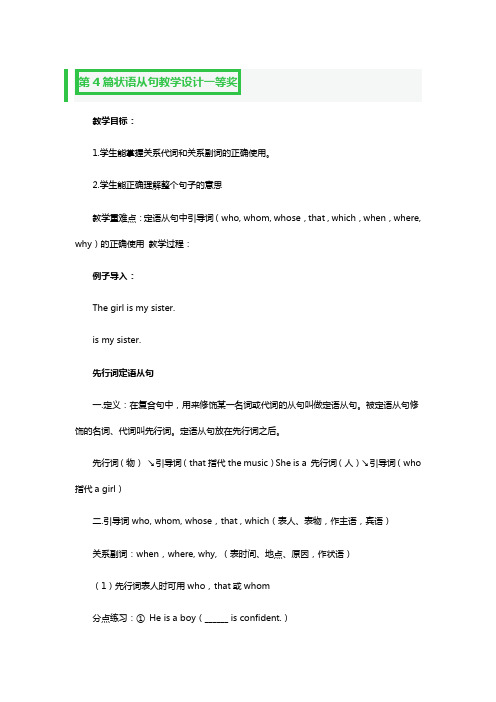
第4篇状语从句教学设计一等奖教学目标:1.学生能掌握关系代词和关系副词的正确使用。
2.学生能正确理解整个句子的意思教学重难点:定语从句中引导词(who, whom, whose,that , which,when,where, why)的正确使用教学过程:例子导入:The girl is my sister.is my sister.先行词定语从句一.定义:在复合句中,用来修饰某一名词或代词的从句叫做定语从句。
被定语从句修饰的名词、代词叫先行词。
定语从句放在先行词之后。
先行词(物)↘引导词(that指代the music)She is a 先行词(人)↘引导词(who 指代a girl)二.引导词who, whom, whose,that , which(表人、表物,作主语,宾语)关系副词:when,where, why, (表时间、地点、原因,作状语)(1)先行词表人时可用who,that或whom分点练习:①He is a boy(______ is confident.)主语②(介词提前)③He is the teacher ( ______ you are waiting for.)宾语归纳总结:当先行词是人:①引导词在句中作主语,引导词用who,that③引导词在从句中作宾语,引导词用who/whom小试牛刀:1.Is this the man with ______ you went to the zoo yesterday?A. whoB. whomC. which2.He is a man ( _______ we can learn).A. whomB. from whichC. from whomlearn from【2013广东湛江】25. —Look! That is the woman I met yesterday.—Oh? She’s my aunt.A. whatB. whoC. whereD. when【2013广东】45. The young lady ______ is interviewing Lin Zhixuan about the program I am a singer is from 21st Century Talent Net.A. whoB. whomC. whichD. whose(2)whose的使用名词A. whichB. whoseC. that引导词后面有名词(表所属)时,引导词用whose(3)先行词表物时,用that或whichthat与which的区别:that和which都可表物,一般可互换,但下列情况只用that1. I’m sure she has something ______ you can borrow.A. thatB. which⑴先行词为:that 2. I’ve read ⑵先行词被all, every, no, some, any, little, much 等修饰时4. This is the only book that belongs to him.⑷先行词被the only, the very, the same, the best, the last等修饰时6. There is a book on the desk belongs to Tom. 桌子上那本书是汤姆的⑹在7 Who is the girl ______ spoke to you just now?Which is the car _____ was made in China?A. thatB. whoC. which[7].当主句that巩固练习:Who is the man ______ I saw yesterday.小试牛刀:I like the music _______ he writes.A. /B. whoC. why D when只用which的情况:1.This is the house in ______ he lives.A. thatB. whichC. who1.先行词是物,且介词提前用whichThe school (______ my father works) looks very beautiful.(my father works in the school)A. whichB. in thatC. in which对比:Is this the man with ______ you went to the zoo yesterday?A. whoB. whomC. which先行词是人,且介词提前用_______.2.先行词(物)与引导词之间有逗号隔开(非限制性定语从句),用which 2.He lives in a house, _______ has many trees around it.A. thatB. whichC. who3.先行词为that, those时,用which3.What’在桌子底下的那些东西是什么?【2011广东】44. The first thing _____ my brother is going to do this afternoon is to write a letter.A. whichB. thatC. whyD. who【2011?广州】The story ______ I read the newspaper was about a common problem among teenagers.A. whoseB. whoC. thatD. where【2013安徽】49. I still remember the college and the teachers_____________I visited in London years ago.A. whatB. whoC. thatD. which(4)关系副词when, where,why的用法:先行词是一个表示时间的词如:time, hour, day, month, year时,其所对应的关系词如在定语从句中作时间状语(不充当从句的主语或宾语),则用关系副词when。
原因状语从句(教案)

教案:原因状语从句一、教学目标1. 让学生理解原因状语从句的概念和用法。
2. 让学生能够正确地运用原因状语从句表达原因和理由。
3. 提高学生的英语句子构建能力和口语表达能力。
二、教学内容1. 原因状语从句的定义和结构。
2. 原因状语从句的常用连接词:because, since, as, because of, due to等。
3. 原因状语从句的例句和练习。
三、教学方法1. 讲授法:讲解原因状语从句的定义、结构和用法。
2. 示例法:通过例句展示原因状语从句的表达方式。
3. 练习法:通过练习题巩固所学内容。
4. 互动法:引导学生进行小组讨论和口语表达。
四、教学步骤1. 引入:提问学生关于“原因”和“理由”的表达方式,引导学生思考。
2. 讲解:讲解原因状语从句的定义、结构和常用连接词。
3. 示例:给出原因状语从句的例句,让学生理解并模仿。
4. 练习:布置练习题,让学生运用原因状语从句表达原因和理由。
5. 互动:组织小组讨论,让学生分享自己的练习成果,并进行口语表达。
五、教学评价1. 课堂练习:检查学生对原因状语从句的掌握程度。
2. 口语表达:评估学生在小组讨论和口语表达中的运用能力。
3. 课后作业:布置相关练习题,巩固学生对原因状语从句的理解和运用。
六、教学活动1. 角色扮演:学生模拟不同的场景,使用原因状语从句来解释原因,如迟到、选择专业等。
2. 小组竞赛:小组间进行竞赛,看哪个小组能够在限定时间内造出更多正确的原因状语从句。
3. 情景对话:创建不同情境,让学生运用原因状语从句进行对话,如在商店询问价格、在医院描述病情等。
七、拓展学习1. 对比学习:介绍其他状语从句,如时间状语从句、地点状语从句等,让学生理解它们与原因状语从句的区别。
2. 语法点拨:讲解原因状语从句中主句和从句的时态关系,如主句为一般现在时,从句用一般现在时等。
八、课堂作业1. 完成练习题:提供一些填空题、改错题、翻译题等,让学生巩固原因状语从句的用法。
原因状语从句和目的状语从句ppt课件

because和because of
• because+ 从句 • because of+ 名词短语
• 他因病不能来。 • He can’t come because he is ill. • He can’t come because of his illness.
Read and combine.
• I bought the house simply. • It is large. • → I bought the house simply because it is large.
1.Everybody stays under the tree. It is very hot.
→ As it is very hot, everybody stays under the tree.
→ Since you do not understand, I will explain again.
目的状语从句
引导词
• so that,in order that等 • “以便”
• I lent him $50 in order that he might go for a holiday. • 我借给他50美元,以便他能去度假。
(1)回答why,只能用because。
A:Why can’t I go? B:__Be_c_au_s_e _ you are too young.
(2)不能将because, since, as等与so连用 。
2. ___A_____ he is ill, ______he cannot come. A. Because, / B. Because, so C. Though, but D. Though, /
英语状语从句教案
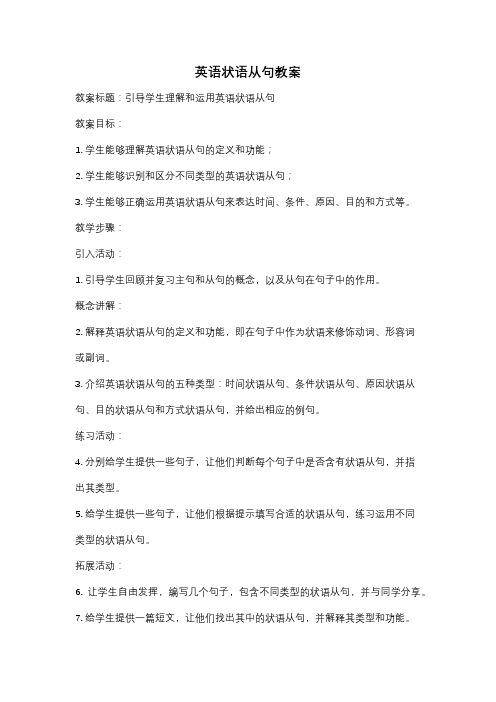
英语状语从句教案教案标题:引导学生理解和运用英语状语从句教案目标:1. 学生能够理解英语状语从句的定义和功能;2. 学生能够识别和区分不同类型的英语状语从句;3. 学生能够正确运用英语状语从句来表达时间、条件、原因、目的和方式等。
教学步骤:引入活动:1. 引导学生回顾并复习主句和从句的概念,以及从句在句子中的作用。
概念讲解:2. 解释英语状语从句的定义和功能,即在句子中作为状语来修饰动词、形容词或副词。
3. 介绍英语状语从句的五种类型:时间状语从句、条件状语从句、原因状语从句、目的状语从句和方式状语从句,并给出相应的例句。
练习活动:4. 分别给学生提供一些句子,让他们判断每个句子中是否含有状语从句,并指出其类型。
5. 给学生提供一些句子,让他们根据提示填写合适的状语从句,练习运用不同类型的状语从句。
拓展活动:6. 让学生自由发挥,编写几个句子,包含不同类型的状语从句,并与同学分享。
7. 给学生提供一篇短文,让他们找出其中的状语从句,并解释其类型和功能。
总结:8. 总结英语状语从句的定义、功能和不同类型,并强调熟练运用状语从句的重要性。
评估:9. 给学生提供一些句子,让他们判断每个句子中是否含有状语从句,并指出其类型。
教学资源:1. 主句和从句的定义和示例;2. 英语状语从句的定义、功能和五种类型的详细解释;3. 含有状语从句的句子练习题;4. 提示填写状语从句的句子练习题;5. 编写状语从句的自由发挥活动;6. 含有状语从句的短文。
教学延伸:1. 鼓励学生在阅读和写作中积极运用状语从句;2. 提供更多的练习题和例句,让学生加深对状语从句的理解和运用能力;3. 引导学生分析和比较状语从句与其他类型从句的区别和联系。
教学提示:1. 通过举例和实际应用来帮助学生理解状语从句的概念和功能;2. 强调不同类型状语从句的引导词和结构特点;3. 鼓励学生积极参与练习和活动,提高他们的独立思考和表达能力。
状语从句(基础版)教学文案

while:持续性动词 /进行时
e.g. I like listening to music while I am doing my homework.
例句:我会待在这里,直到你回来为止。
I’ll stay here until you come back.
◆当主句谓语动词是非延续性动词时, 主句常用否定形式。 not… until…“直到……才……” 例句:他直到做完作业才睡觉。
He didn’t go to bed until he finished his homework.
We’ll come over to see you on Saturday if we have time. We should serve the people as / so long as we live.
1. We will be able to get there on time, ____ our car
whenever
• 表:每当… • Whenever we are in trouble, he will come to help
us.
• Whenever you say “I’m sorry”, look the person right in the eyes.
• Smile whenever you pick up the phone.
doesn’t break down on the road.
A. as soon as
B. as far asB.C as long asD. as well as
(完整word版)状语从句教案

状语从句(2h)教学目标:掌握9大状语从句及其中重要的引导词与句型。
由于高考中状语从句经常和从句的时态语态,动词短语的搭配,以及状语从句的省略,虚拟语气与倒装一起考查。
因此必须掌握好:1 时间状语从句中各种引导词引导的主句与从句的时态的判断2 地点状语从句中表示抽象含义时从句必须在主句之前3 原因状语从句中because,as,now that的位置问题4 目的状语从句中的so that与在结果状语从句中的区分5 结果状语从句中的so/such…that…的特殊结构及其倒装6 条件状语从句中的if,unless的用法7 方式状语从句中的虚拟语气的用法8 让步状语从句中的as, though做引导词时的倒装用法教学重点:1 掌握常用的状语从句中的引导词2 判断状语从句中的时态3 状语从句中的倒装情况:no sooner…than, hardly/scarcely…when, not…until用于句首时的倒装;结果状语从句中so/such置于句首时的倒装情况;as/though引导的让步状语从句的倒装情况4 as if/though引导的方式状语从句中的虚拟语气教学进程:导入:状语从句在句子中作状语,修饰谓语。
㈠时间状语从句⒈回顾有哪些词可以引导时间状语从句—when, while, as表示“当…时”; immediately, instantly, as soon as, directly, the moment, no sooner than, hardly when, scarcely when, once表示“一…就…”;till, until, not until表示“直到…才”;before 表示“还没来得及…就…”,“不到…就…”;since表示“自从…”;every time, each time, next time, the first time, any time, all the time表示“每当…”,“每次…”,“下次…”等等⒉状语从句中的时态的判断方法:⑴过去,现在,将来⑵延续性与非延续性/时间点与时间段⑶主从句中的谓语动词的先后关系⑷判断开始时间与截止时间⒊when, while, as都可以表示主从句动作同时进行(口头造句举例)如:when the music fades away, people tide away.She sat there alone while others were all dancing.He dances joyfully as the music goes.当主句动词为短暂性,从句动词用延续性动词的进行时态表示一段时间内的动作时,三个词可互换。
状语从句——原因和目的状语从句-教案
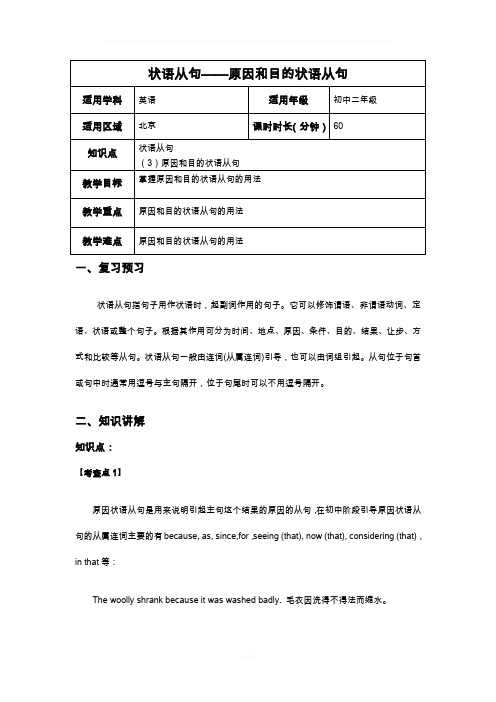
一、复习预习状语从句指句子用作状语时,起副词作用的句子。
它可以修饰谓语、非谓语动词、定语、状语或整个句子。
根据其作用可分为时间、地点、原因、条件、目的、结果、让步、方式和比较等从句。
状语从句一般由连词(从属连词)引导,也可以由词组引起。
从句位于句首或句中时通常用逗号与主句隔开,位于句尾时可以不用逗号隔开。
二、知识讲解知识点:【考查点1】原因状语从句是用来说明引起主句这个结果的原因的从句,在初中阶段引导原因状语从句的从属连词主要的有because, as, since,for,seeing (that), now (that), considering (that),in that等:The woolly shrank because it was washed badly. 毛衣因洗得不得法而缩水。
I can’t get to sleep because of the noise outside. 由于外面声音嘈杂我睡不着。
Since [As] we’ve no money, we can’t buy it. 由于我们没钱,我们无法购买它。
Seeing that it’s raining, we’d better stay indoors. 既然外边在下雨,我们最好待在室内。
Now that you are here, you’d better stay. 你既然来了,最好还是留下吧(既来之,则安之)。
【注】除以上提到的大家比较熟悉的引导原因状语从句的从属连词外,when有时也可引导原因状语从句(when表示“既然”)I won’t tell you when you won’t listen. 既然你不想听,我就不告诉你了。
原因状语从句应注意的问题1、because , since , as , for,辨析1)because语势最强,用来说明人所不知的原因,回答why提出的问题。
当原因是显而易见的或已为人们所知,就用as或since。
初中英语语法状语从句教案

初中英语语法状语从句教案1. 让学生掌握状语从句的定义和作用,理解状语从句与主句之间的关系。
2. 使学生能够识别并运用常见的时间状语从句、地点状语从句、原因状语从句、目的状语从句、条件状语从句、让步状语从句、结果状语从句和方式状语从句。
3. 培养学生运用状语从句进行正确表达的能力,提高学生的英语写作和口语水平。
二、教学内容1. 状语从句的定义和作用2. 常见状语从句的类型及其引导词3. 状语从句的时态和语态4. 状语从句在句子中的位置5. 状语从句的实例分析三、教学步骤1. 引入:通过一个简单的句子,引导学生思考状语从句的概念。
例如:I went to the park.(我去公园。
)提问:这个句子是否完整?是否需要添加其他成分来修饰?2. 讲解状语从句的定义和作用:解释状语从句是用来修饰主句的从句,位于主句之后,用来说明动作发生的时间、地点、原因、目的、条件、让步、结果和方式等。
3. 介绍常见状语从句的类型及其引导词:时间状语从句:when, while, after, before, as soon as, until, since等。
地点状语从句:where, wherever等。
原因状语从句:because, since, as等。
目的状语从句:so that, in order that等。
条件状语从句:if, unless, until等。
让步状语从句:although, though等。
结果状语从句:so that, so...that...等。
方式状语从句:as, as if, as though等。
4. 讲解状语从句的时态和语态:状语从句的时态和语态应与主句保持一致。
5. 讲解状语从句在句子中的位置:状语从句通常位于主句之后,但有时也可以放在主句之前,用逗号与主句分隔。
6. 实例分析:分析一些含有状语从句的句子,让学生明确状语从句的作用和用法。
例如:When I came home, my parents were watching TV.(当我回家时,我的父母正在看电视。
(完整版)状语从句教案
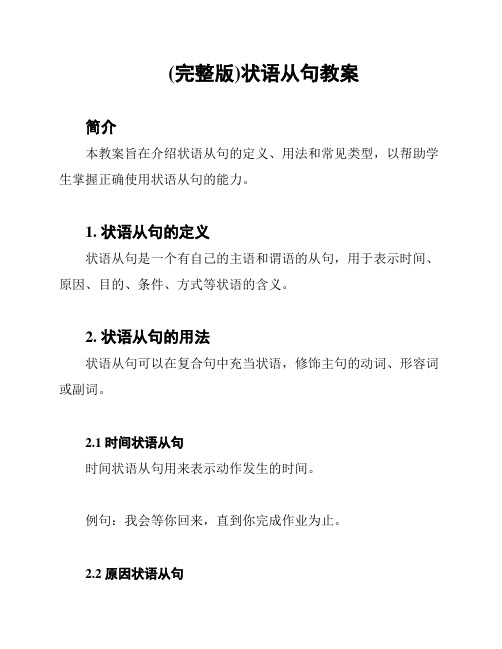
(完整版)状语从句教案简介本教案旨在介绍状语从句的定义、用法和常见类型,以帮助学生掌握正确使用状语从句的能力。
1. 状语从句的定义状语从句是一个有自己的主语和谓语的从句,用于表示时间、原因、目的、条件、方式等状语的含义。
2. 状语从句的用法状语从句可以在复合句中充当状语,修饰主句的动词、形容词或副词。
2.1 时间状语从句时间状语从句用来表示动作发生的时间。
例句:我会等你回来,直到你完成作业为止。
2.2 原因状语从句原因状语从句用来表示主句中的动作的原因或理由。
例句:因为天气太冷,所以我们取消了野餐计划。
2.3 目的状语从句目的状语从句用于表示主句中的动作的目的或意图。
例句:我来这里是为了研究更多的知识。
2.4 条件状语从句条件状语从句用来表示主句中的动作发生的条件。
例句:如果明天下雨,我们就取消郊游活动。
2.5 方式状语从句方式状语从句用来表示主句中的动作发生的方式或方法。
例句:她以一种非常温柔地方式对待孩子们。
3. 练请在下列句子中选择正确的状语从句填空:1. 我会等你回来,______你完成作业为止。
A. 除非B. 既然C. 因为2. 她去超市买了很多东西,______家里没有食物了。
A. 因此B. 只要C. 不管3. 如果你迟到了,______开车去学校。
A. 我们会B. 我会C. 我们不会参考答案:1. A2. A3. B结语通过学习本教案,希望学生们能够理解并正确运用状语从句,提高英语写作和口语表达的能力。
状语从句教案
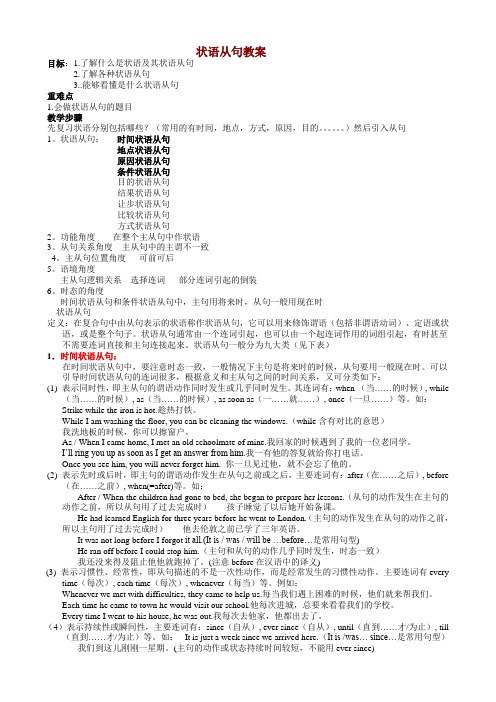
状语从句教案目标:1.了解什么是状语及其状语从句2.了解各种状语从句3..能够看懂是什么状语从句重难点1.会做状语从句的题目教学步骤先复习状语分别包括哪些?(常用的有时间,地点,方式,原因,目的。
)然后引入从句1。
状语从句:时间状语从句地点状语从句原因状语从句条件状语从句目的状语从句结果状语从句让步状语从句比较状语从句方式状语从句2。
功能角度在整个主从句中作状语3。
从句关系角度主从句中的主谓不一致4。
主从句位置角度可前可后5。
语境角度主从句逻辑关系选择连词部分连词引起的倒装6。
时态的角度时间状语从句和条件状语从句中,主句用将来时,从句一般用现在时状语从句定义:在复合句中由从句表示的状语称作状语从句,它可以用来修饰谓语(包括非谓语动词)、定语或状语,或是整个句子。
状语从句通常由一个连词引起,也可以由一个起连词作用的词组引起,有时甚至不需要连词直接和主句连接起来。
状语从句一般分为九大类(见下表)1.时间状语从句:在时间状语从句中,要注意时态一致,一般情况下主句是将来时的时候,从句要用一般现在时。
可以引导时间状语从句的连词很多,根据意义和主从句之间的时间关系,又可分类如下:(1) 表示同时性,即主从句的谓语动作同时发生或几乎同时发生。
其连词有:when (当……的时候), while(当……的时候), as(当……的时候), as soon as(一……就……), once(一旦……)等。
如:Strike while the iron is hot.趁热打铁。
While I am washing the floor, you can be cleaning the windows.(while含有对比的意思)我洗地板的时候,你可以擦窗户。
As / When I came home, I met an old schoolmate of mine.我回家的时候遇到了我的一位老同学。
I’ll ring you up as soon as I get an answer from him.我一有他的答复就给你打电话。
教案状语从句初中
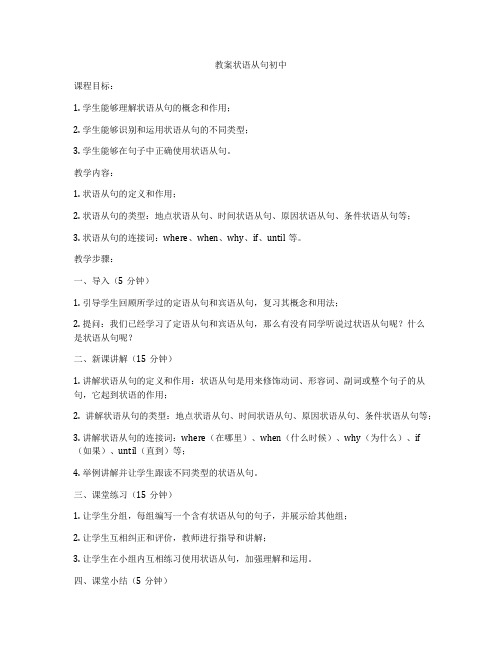
教案状语从句初中课程目标:1. 学生能够理解状语从句的概念和作用;2. 学生能够识别和运用状语从句的不同类型;3. 学生能够在句子中正确使用状语从句。
教学内容:1. 状语从句的定义和作用;2. 状语从句的类型:地点状语从句、时间状语从句、原因状语从句、条件状语从句等;3. 状语从句的连接词:where、when、why、if、until等。
教学步骤:一、导入(5分钟)1. 引导学生回顾所学过的定语从句和宾语从句,复习其概念和用法;2. 提问:我们已经学习了定语从句和宾语从句,那么有没有同学听说过状语从句呢?什么是状语从句呢?二、新课讲解(15分钟)1. 讲解状语从句的定义和作用:状语从句是用来修饰动词、形容词、副词或整个句子的从句,它起到状语的作用;2. 讲解状语从句的类型:地点状语从句、时间状语从句、原因状语从句、条件状语从句等;3. 讲解状语从句的连接词:where(在哪里)、when(什么时候)、why(为什么)、if (如果)、until(直到)等;4. 举例讲解并让学生跟读不同类型的状语从句。
三、课堂练习(15分钟)1. 让学生分组,每组编写一个含有状语从句的句子,并展示给其他组;2. 让学生互相纠正和评价,教师进行指导和讲解;3. 让学生在小组内互相练习使用状语从句,加强理解和运用。
四、课堂小结(5分钟)1. 教师引导学生总结本节课所学的内容,包括状语从句的定义、类型和连接词等;2. 强调状语从句在句子中的作用和重要性;3. 提醒学生要注意状语从句的使用时机和位置。
五、作业布置(5分钟)1. 让学生回家后编写三个含有不同类型状语从句的句子,并写在作业本上;2. 要求学生在句子中正确使用状语从句,并注意连接词的使用。
教学反思:本节课通过讲解和练习,让学生了解了状语从句的概念、类型和连接词等知识。
在课堂练习环节,学生能够分组编写含有状语从句的句子,并在小组内进行练习和展示。
但在练习过程中,发现部分学生对状语从句的运用还存在一定的困难,需要进一步加强指导和练习。
高中英语《状语从句》教案

高中英语《状语从句》教案一、教学目标1. 理解状语从句的定义和作用;2. 分辨不同类型的状语从句,并能正确运用;3. 学会通过状语从句与主句构成复合句。
二、教学重点1. 理解状语从句的定义和作用;2. 分辨不同类型的状语从句,并能正确运用。
三、教学难点1. 学会通过状语从句与主句构成复合句。
四、教学准备1. 教材:教学课本、练习册;2. 多媒体设备。
五、教学过程1. 导入(5分钟)为了引起学生对状语从句的兴趣,教师可以先给学生出几个句子,让他们观察并分析句子结构。
例句:a) While I was studying, my phone rang.b) If it rains tomorrow, we won't go to the park.引导学生思考这些句子中的从句是什么作用,并引导他们尝试理解状语从句的概念。
2. 知识讲解(15分钟)解释状语从句的定义和作用,强调状语从句与主句的关系,并通过几个例句进一步说明。
教师可以按照以下顺序讲解不同类型的状语从句:a) 时间状语从句b) 条件状语从句c) 原因状语从句d) 结果状语从句e) 目的状语从句解释每个类型的状语从句时,可以给出相应的例句,并解释例句中状语从句的用法和意义。
3. 练习与巩固(25分钟)通过练习题帮助学生巩固所学的知识。
例题:1. _______ I was reading a book, the phone rang.a) Ifb) Whilec) Becaused) So2. We won't go to the park _______ it rains.a) whenb) ifc) becaused) so让学生独立完成练习题,并检查答案,解释正确答案的原因。
4. 拓展与应用(15分钟)通过提供更复杂的句子和情境,让学生在实际应用中运用状语从句。
例句:a) If I have time, I will visit my grandparents this weekend.b) Unless you apologize, I won't forgive you.教师可以组织学生分组讨论、编写对话或者写作,要求他们使用状语从句构成复杂句。
状语从句教学案
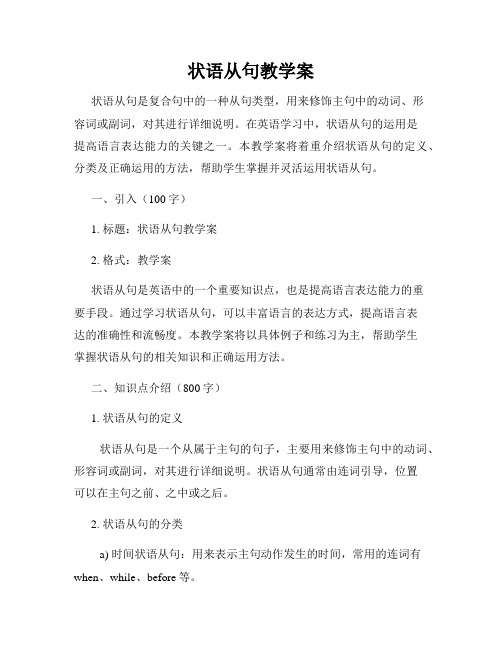
状语从句教学案状语从句是复合句中的一种从句类型,用来修饰主句中的动词、形容词或副词,对其进行详细说明。
在英语学习中,状语从句的运用是提高语言表达能力的关键之一。
本教学案将着重介绍状语从句的定义、分类及正确运用的方法,帮助学生掌握并灵活运用状语从句。
一、引入(100字)1. 标题:状语从句教学案2. 格式:教学案状语从句是英语中的一个重要知识点,也是提高语言表达能力的重要手段。
通过学习状语从句,可以丰富语言的表达方式,提高语言表达的准确性和流畅度。
本教学案将以具体例子和练习为主,帮助学生掌握状语从句的相关知识和正确运用方法。
二、知识点介绍(800字)1. 状语从句的定义状语从句是一个从属于主句的句子,主要用来修饰主句中的动词、形容词或副词,对其进行详细说明。
状语从句通常由连词引导,位置可以在主句之前、之中或之后。
2. 状语从句的分类a) 时间状语从句:用来表示主句动作发生的时间,常用的连词有when、while、before等。
b) 地点状语从句:用来表示主句动作发生的地点,常用的连词有where、wherever等。
c) 原因状语从句:用来表示主句动作的原因,常用的连词有because、since、as等。
d) 条件状语从句:用来表示主句动作的条件,常用的连词有if、unless等。
e) 目的状语从句:用来表示主句动作的目的,常用的连词有so that、in order that等。
f) 结果状语从句:用来表示主句动作的结果,常用的连词有so...that、such...that等。
g) 方式状语从句:用来表示主句动作的方式,常用的连词有as、as if等。
3. 状语从句的引导词的使用不同类型的状语从句需要使用不同的引导词,根据状语从句的分类掌握相应的引导词的用法非常重要。
同时,学生还需要注意一些特殊状语从句的引导词的用法,如时间状语从句中的"when"和"while"的区别等。
高三英语教案:《状语从句复习》教学设计

高三英语教案:《状语从句复习》教学设计本文题目:高三英语复习教案:状语从句复习教案【备考策略】一、地点状语从句地点状高考资源网语从句通常由where, wherever 引导。
Where I live there are plenty of trees.我住的地方树很多。
Wherever I am I will be thinking of you.不管我在哪里我都会想到你。
二、方式状语从句方式状语从句通常由as, (just) as …so …, as if, as though引导。
1) as, (just) as …so …引导的方式状语从句通常位于主句后,但在(just) as …so …结构中位于句首,这时as从句带有比喻的含义,意思是“正如… “,“就像“,多用于正式文体,例如:Always do to the others as you would be done by.你希望人家怎样待你,你就要怎样待人。
As water is to fish, so air is to man.我们离不开空气,犹如鱼儿离不开水。
Just as we sweep our rooms, so we should sweep backward ideas from our minds.正如打扫房屋一样,我们也要扫除我们头脑中落后的东西。
2) as if, as though两者的意义和用法相同,引出的状语从句谓语多用虚拟语气,表示与事实相反,有时也用陈述语气,表示所说情况是事实或实现的可能性较大。
汉译常作“仿佛… …似的“,“好像… …似的“,例如:They completely ignore these facts as if (as though) they never existed.他们完全忽略了这些事实,就仿佛它不存在似的。
(与事实相反,谓语用虚拟语气。
)He looks as if (as though) he had been hit by lighting.他那样子就像被雷击了似的。
原因状语从句(教案)
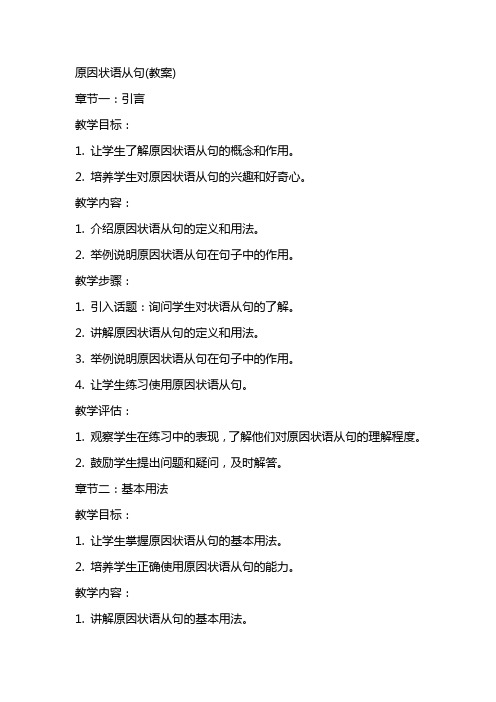
原因状语从句(教案)章节一:引言教学目标:1. 让学生了解原因状语从句的概念和作用。
2. 培养学生对原因状语从句的兴趣和好奇心。
教学内容:1. 介绍原因状语从句的定义和用法。
2. 举例说明原因状语从句在句子中的作用。
教学步骤:1. 引入话题:询问学生对状语从句的了解。
2. 讲解原因状语从句的定义和用法。
3. 举例说明原因状语从句在句子中的作用。
4. 让学生练习使用原因状语从句。
教学评估:1. 观察学生在练习中的表现,了解他们对原因状语从句的理解程度。
2. 鼓励学生提出问题和疑问,及时解答。
章节二:基本用法教学目标:1. 让学生掌握原因状语从句的基本用法。
2. 培养学生正确使用原因状语从句的能力。
教学内容:1. 讲解原因状语从句的基本用法。
2. 举例说明原因状语从句在句子中的作用。
教学步骤:1. 回顾上一节课的内容,加深学生对原因状语从句的理解。
2. 讲解原因状语从句的基本用法。
3. 举例说明原因状语从句在句子中的作用。
4. 让学生进行练习,巩固所学内容。
教学评估:1. 观察学生在练习中的表现,了解他们对原因状语从句的掌握程度。
2. 鼓励学生提出问题和疑问,及时解答。
章节三:常用连词教学目标:1. 让学生熟悉并掌握原因状语从句中常用的连词。
2. 培养学生正确使用原因状语从句的能力。
教学内容:1. 介绍原因状语从句中常用的连词。
2. 举例说明常用连词在原因状语从句中的使用。
教学步骤:1. 回顾上一节课的内容,加深学生对原因状语从句的理解。
2. 介绍原因状语从句中常用的连词。
3. 举例说明常用连词在原因状语从句中的使用。
4. 让学生进行练习,巩固所学内容。
教学评估:1. 观察学生在练习中的表现,了解他们对常用连词的掌握程度。
2. 鼓励学生提出问题和疑问,及时解答。
章节四:实践应用教学目标:1. 让学生能够熟练运用原因状语从句进行表达。
2. 培养学生的实际应用能力。
教学内容:1. 讲解如何运用原因状语从句进行表达。
初中英语专题教案---状语从句(二)
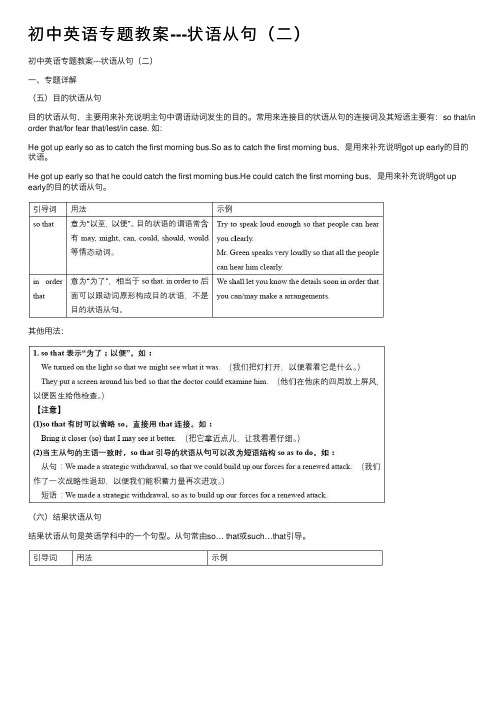
初中英语专题教案---状语从句(⼆)初中英语专题教案---状语从句(⼆)⼀、专题详解(五)⽬的状语从句⽬的状语从句,主要⽤来补充说明主句中谓语动词发⽣的⽬的。
常⽤来连接⽬的状语从句的连接词及其短语主要有:so that/in order that/for fear that/lest/in case. 如:He got up early so as to catch the first morning bus.So as to catch the first morning bus,是⽤来补充说明got up early的⽬的状语。
He got up early so that he could catch the first morning bus.He could catch the first morning bus,是⽤来补充说明got up early的⽬的状语从句。
其他⽤法:(六)结果状语从句结果状语从句是英语学科中的⼀个句型。
从句常由so… that或such…that引导。
其他⽤法:(七)让步状语从句让步状语从句,是指状语从句中的⼀种,其本⾝也是状语从句。
⼀般翻译为“尽管……”或“即使……”,就是我们⽇常⽣活中⽤的“退⼀步说…”的感觉。
引导让步状语从句的连词主要有以下这些:though,although,while,as;even if,even though;whether...or...;no matter+疑问词,疑问词-ever,regardless of+名词/名词短语/名词从句,despite,in spite of。
切记although,though 不可与but连⽤,但可以与still和yet连⽤。
其他⽤法:区分:⼆、课堂检测⽬的状从:1. He left in ___a hurry ___he forgot to lock the door.A. such, thatB. so, thatC. such, asD. so, when2. You must improve your study method _____ you may make progress in your studies.A. so as toB. in order toC. soD. in order that3. The Prime Minister got to the platform and sat down, ____to answer the questions.A. preparingB. being preparingC. prepared D . to prepare4. They demanded a rise in their wages ___up for the ____ cost of living.A. to make, increaseC. to be made, increasingD. making, increasing5. ---Why did you move the table over there?--- ____ the new sofa.A. To make room forB. Share room withC. Given room toD. Saving room for6.My parents live in a small village.They always keep candles in the house()there is a power out.A.ifB.unlessC.in caseD.so that7.I’d like to arrive20minutes early ()I can have time for a cup of tea.A.as soon asB.as a resultC.in caseD.so that8. You’d better take something to read when you go to see the doctor ()you have to wait.A. even ifB.as ifC.in caseD.in order that9. The little time we have together we try ____ wisely.A. spending itB. to spend itC. to spendD. spending that10. Paul doesn’t have to be made _____. He always works hard.A. learnB. to learnC. learnedD. learning1-5 A D C A A6-10 C D B C B1. It was five o’clock in the afternoon ____ they climbed up to the top of the mountain.A. sinceB. whenC. thatD. until2. Do think ____ reading.A. whileB. whenC. asD. for3. ____ the window, my hand was cut unexpectedly.A. CleaningB. To cleanC. While cleaningD. While I was cleaning4. ____, one becomes more experienced.A. When one grows olderB. As one grows olderC. The older one growsD. While one will be older5. I shall ring you up ____ you should forget to come.A. becauseB. forC. in caseD. in order that6. Do you mind ____ how you succeed?A. if I go and seeB. if I go seeingC. my going and seeD. my go to see7. — Are you sure that you’ve met him before? — ____ I’m mistaken.A. UnlessB. IfC. When8. The students will go on playing football ____ or not.A. whether it rainsB. if it rainsC. whether it will rainD. no matter it rains9. Francis Preston Blair, ____ born in Kentucky, lived and practiced law in Missouri.A. wasB. he wasC. althoughD. as10. The wounded soldier died though the hospital ____.A. tried to pull him throughB. managed to pull him throughC. went all out to pull through himD. managed to pull through him11. ____, he is healthy, however.A. Though older as heB. Though he is as oldC. Old as he isD. Old as he will be12. No matter ____ hard it may be, I’ll carry it out.A. whatB. whateverC. howD. however13. — Have you found your key?— Yes, it was lying ____ I often watch TV in my room.A. whatB. whichC. howD. where14. — How is it that you are late for class again? — ____.A. By bus and them on footB. Because I missed the busC. It’s quite all right15. ____ you have come, you must not go away so soon.A. ForB. Now thatC. BecauseD. So that1.B2.A3.D4.B5.C6.A7.A8.A9.C 10.A 11.C 12.C 13.D 14.B 15.B让步状从:1. Alice is a good student. she has one shortcomingA.althoughB.as ChoweverD.even if2. We will not give up we shall fail ten times.A.even ifB.asC.thoughD.until3.He had measured meI could speakA.untilB.beforeC.whileD.as4.,he knows more than you.A.Child as he isB.As he is a childC.A child as he isD.However he is a child5.Lin Tao is sure to come to help you the moment his homework.B.he has finishedC.he finishedD.he had finished6.diffcult the task may be,we will try our best to finish itA.No matterB.No wonderC.ThoughD.However7.Durning the Spring Festival,a lot of people take the bullet train home it is expensive.A.soB.asC.becauseD.though8.we grow older,we grow wiser.A.WithB.SinceC.WhileD.As9. Althou he is considered a great writer,A.his works is not widely readB.but his works are not widely readC.however his works are not widely readD.yet his works are not widely read10. ______, Mother will wait for him to have dinner together.A. However late is heB. However he is lateC. However is he lateD. However late he is填空:1. Heavily it was raining outside, they start out very early.2. he looks weak, he is healthy.3. you believe it or not, it's true.4. Will you watch my clothes I have a swim?5. he was worn out, he kept on working.(⼀)单项选择题1. -Was Eric's father very strict with him?-Yes. He never praised him . He became one of the top students in his grade.A. sinceB. whenC. untilD. became2. I him the news as soon as he back.A. will tell;will comeB. will tell;comesC. tell;will comeD. tell;comes3. Don't worry about me. I will call you I arrive in London.A. whenB. whileC.as soon asD. after4. I will tell Jenny about the good news as soon as she back.A. comesB. cameC. will comeD. has come5. I have heard a lot of good things about you I came back from abroad.A. sinceB. untilC. beforeD. when6.--Have you finished your speech?-No. Last night I was writing I heard someone shouted “Help”.A. untilB. whileC. ifD. when7. What were you doing the rainstorm came?D. after8. My father was watching TV my mother was cooking.A. whenB. untilC.whileD.as soon as9. I will give him the gift as soon as heA. will arriveB. arriveC. arrivesD. arrived10.-Let's go and play games, Ok?-Sorry, Mike. I won't go out I finish my homework.A. untilB. whenC. althoughD. if11. My father was watering the flowers in the garden my mother was cooking lunch in the kitchen.A. ifB. whileC. unlessD. when12. I the bike to you when I get home.-Thank you.A. giveB. givesC. gaveD. will give13.-Where's your report, Sam? -Sorry, Boss. I'll give it to you as soon as it .A. finishesB. will finishC.is finishedD. will be finished14. Wu Yi will help with the housework he gets home after school.C.as soon asD. until15. Phone me you get to Wuzhong.A. sinceB.so thatC.as soon asD. while1.B2.B3.C4.A5.A6.B7.B8.B9.C 10.D 11.C 12.C 13.C 14.B 15.B(⼆)填空题Time clause1. It is 3 years . Mr. Wallace bought this watch and it will be 3 years he buys another one.2. He was about to tell me the secret someone patted him on the shoulder.3.-Why didn't you tell him about this?--He rushed out of the room I could say a word.4. I went to GuiLin, I was deeply impressed by its fantastic scenery.5. you arrive home, ring me immediately.6. the student meets a new word, he will always look it up in the dictionary.7. A good story teller must be able to hold the listeners "curiosity he reaches the end of the story. 1.since;before 2.when 3.before 4.The first/second..…/last time 5.The moment 6.Every time 7.untilPlace clause1. Mr. Smith always tells us: “ there is a will, there is a way"2. Don't put the sharp knife little kids can get it.3. After the war, a new school building was built there used to be a theatre.4. After the war, a new school building was built in the place there used to be a theatre.5. It is certain that Mr. Daniel will go he is needed to ease the suffering of his people.1- 4.where 5.where/whereverPurpose clause1. Guo Jingming had to stand on the table he could be seen by his fans.2. Guo Jingming had to stand on the table he could be seen by his fans.3. He had made a mistake, but then he corrected the situation it got worse.4. He had made a mistake,but then he corrected the situation worse consequence.1.so that2.in order that3.in case4.in case ofResult clause1. Pop music is such an important part of society it has even influenced our language.2. His plan was a good one that we all agreed to accept it.3.His plan was such a good one we all agreed to accept4. So unforgettable was the movie titled, “The Eise of Tomorro”Tim watched it over and over again.1.that2.such3.as4.thatCondition clause1. homosexual love exists in the boarding school, teachers will try to get rid of at all costs.2. Small boats can easily turn over in the water they are not managed carefully.3. You will succeed in the end you give up half way.4. You are not required to speak asked to.5. The medicine will not have any negative effects taken according to the directions. 1.As/So long as 2.if 3.unless 4.unless 5.if/whenReason clause1. everyone is here, let's begin our class.2. everyone is here, let's begin our class.3. You can't make a u-turn here this is a one-way street.4. The animal must have been a puma, peculiar paw prints were found by many.5. Thomas and Jackson are similar the both have solid muscles and great physical endurance.6. Helen could easily find the way to the hotel she was familiar with the area.7. Handwritten documents are more valuable to researchers, historians say. Their reliability can be confirmed.1.Since2.Now that3.as/because4.for5.in that6.because/since/as7.becauseConcession clause1. Tom comes from Canada, he knows Chinese manners very well.2. the weather was freezing, the PLA soldiers managed to reach the destination in time.3. the fact that the weather was freezing, the PLA soldiers managed to reach the destination in time.4. the freezing weather, the PLA soldiers managed to reach the destination in time.5. the freezing weather, the PLA soldiers managed to reach the destination in time.6. the freezing weather, the PLA soldiers managed to reach the destination in time.7. Liu Wei loves his students, he is very strict with them.8.The cost of living in Glasgow is among the lowest in Britain the quality of its life is one of the highest9. hungry I am, I never seem to be able to finish off this loaf of bread.10. well-prepared you are, you still need a lot of luck in mountain climbing.1.Although/Though/While2.Even if/though3.Despite4.Despite5.Regardless of6.In spite of7.While8.while9.However 10.No matter howManner clause1. We don't speak to strangers we talk to our close friends.2. The teacher often joined student's activities she were a student like us.3. When in Rome, do the Romans do.1.the way2.as if/though3.as(三)把下列句⼦改成带有状语从句的复合句1. He didn’t come. He was ill.(because)2. He is too young to join the army.(so....……that)3. He studies English hard. He is over seventy.(though)4. We will stay at home. It rains.(if)5. He was doing his homework. Someone knocked at the door.(when)6. I waited. He came back.(not.....until)7. He is tall. I am tall.(as.....…as)8. My mother was cooking. I was listening to the news.(while)9. It was a hot day. We couldn't sleep well.(such....….hat)10. He came into the warm room. He took off his cap and sat down.(as soon as) Keys:1. He didn't come because he was ill.2. He is so young that he can’t join the army.3. Though he is over seventy, he studies English hard.4. We will stay at home if it rains.5. He was doing his homework when someone knocked at the door.6. I didn't leave until he came back.7. He is as tall as I(am)8. My mother was cooking while I was listening to the news.9. It was such a hot day that we couldn't sleep well.10. He took off his cap and sat down as soon as he came into the warm room.。
原因状语从句(教案)

原因状语从句(教案)第一章:引言1.1 目的:让学生了解原因状语从句的概念和作用。
1.2 教学内容:原因状语从句的定义原因状语从句的用法1.3 教学活动:向学生介绍原因状语从句的概念和作用用实例解释原因状语从句的用法第二章:原因状语从句的构成2.1 目的:让学生掌握原因状语从句的构成和连接词。
2.2 教学内容:原因状语从句的构成:主句+ 原因状语从句原因状语从句的连接词:because, since, as, because of, due to 2.3 教学活动:向学生讲解原因状语从句的构成和连接词用实例展示不同连接词的用法第三章:原因状语从句的用法3.1 目的:让学生了解原因状语从句在句子中的位置和用法。
3.2 教学内容:原因状语从句的位置:放在主句之前或之后原因状语从句的用法:解释主句中的动作或状态的原因向学生讲解原因状语从句的位置和用法用实例展示不同位置的用法第四章:原因状语从句的翻译4.1 目的:让学生掌握原因状语从句的翻译技巧。
4.2 教学内容:原因状语从句的翻译技巧:根据上下文理解原因状语从句的意义原因状语从句的翻译实例4.3 教学活动:向学生讲解原因状语从句的翻译技巧用实例展示不同原因状语从句的翻译方法第五章:练习与巩固5.1 目的:让学生通过练习巩固所学的原因状语从句的知识。
5.2 教学内容:练习题:选择题、填空题、翻译题巩固原因状语从句的知识5.3 教学活动:向学生发放练习题学生独立完成练习题教师解答学生的问题并给予反馈第六章:原因状语从句的扩展6.1 目的:让学生了解原因状语从句的扩展形式。
原因状语从句的扩展形式:用不定式、分词、独立主格结构等表达原因原因状语从句的扩展实例6.3 教学活动:向学生讲解原因状语从句的扩展形式用实例展示不同扩展形式的用法第七章:原因状语从句在实际语境中的应用7.1 目的:让学生学会在实际语境中使用原因状语从句。
7.2 教学内容:原因状语从句在实际语境中的应用:描述日常生活中的原因和解释事物发生的原因原因状语从句的实际语境实例7.3 教学活动:向学生讲解原因状语从句在实际语境中的应用用实例展示不同实际语境中原因状语从句的用法第八章:原因状语从句的错误分析8.1 目的:让学生了解并避免在使用原因状语从句时出现的常见错误。
原因、目的、结果状语从句精讲
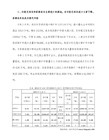
1) The teacher’s teaching was so interesting that all the students were very excited.
老师讲课非常有趣,学生们都感到很兴奋。
2) Jack studies so hard that he always makes progress.
刘先生由于初来乍到,因此在这儿没有太多的朋友。
since语气较弱。它所引导的从句一般放在主句之前,意为“既然”;就对方陈述的事实作为理由。
例:
1) Since Li Ming doesn’t know the answers to the problems, let’s ask Wang Lei to do it.
我把窗户打开以便新鲜空气可以进来。
3) We will tell you everything about it soon in order that you can prepare for that.
不久我们将会让你知道详情,以便你能够做准备。(目的)
三、结果状语从句通常由连词so…that, such…that引导。二者都表示“如此…以至于”之意。
我爷爷心地善良,大家都喜欢和他聊天。
2) It is so cold that I have to wear warm clothes.
(= It is such cold weather that I have to wear warm clothes.)
天气如此的冷,以至于我不得不穿上暖和的衣服。
杰克学习很是努力,结果他不断取得进步。
3) It’s such a nice day that all of us want to go camping.
- 1、下载文档前请自行甄别文档内容的完整性,平台不提供额外的编辑、内容补充、找答案等附加服务。
- 2、"仅部分预览"的文档,不可在线预览部分如存在完整性等问题,可反馈申请退款(可完整预览的文档不适用该条件!)。
- 3、如文档侵犯您的权益,请联系客服反馈,我们会尽快为您处理(人工客服工作时间:9:00-18:30)。
一、复习预习状语从句指句子用作状语时,起副词作用的句子。
它可以修饰谓语、非谓语动词、定语、状语或整个句子。
根据其作用可分为时间、地点、原因、条件、目的、结果、让步、方式和比较等从句。
状语从句一般由连词(从属连词)引导,也可以由词组引起。
从句位于句首或句中时通常用逗号与主句隔开,位于句尾时可以不用逗号隔开。
二、知识讲解知识点:【考查点1】原因状语从句是用来说明引起主句这个结果的原因的从句,在初中阶段引导原因状语从句的从属连词主要的有because, as, since,for,seeing (that), now (that), considering (that),in that 等:The woolly shrank because it was washed badly. 毛衣因洗得不得法而缩水。
I can’t get to sleep because of the noise outside. 由于外面声音嘈杂我睡不着。
Since [As] we’ve no money, we can’t buy it. 由于我们没钱,我们无法购买它。
Seeing that it’s raining, we’d better stay indoors. 既然外边在下雨,我们最好待在室内。
Now that you are here, you’d better stay. 你既然来了,最好还是留下吧(既来之,则安之)。
【注】除以上提到的大家比较熟悉的引导原因状语从句的从属连词外,when有时也可引导原因状语从句(when表示“既然”)I won’t tell you when you won’t listen. 既然你不想听,我就不告诉你了。
原因状语从句应注意的问题1、because , since , as , for,辨析1)because语势最强,用来说明人所不知的原因,回答why提出的问题。
当原因是显而易见的或已为人们所知,就用as或since。
I didn’t go, because I was afraid.Since /As the weather is so bad, we have to delay our journey.2)由because引导的从句如果放在句末,且前面有逗号,则可以用for来代替。
但如果不是说明直接原因,而是多种情况加以推断,就只能用for。
例:He is absent today, because / for he is ill. He must be ill, for he is absent today.3)as和for的区别:通常情况下,as引导的从句在主句前,for引导的从句在主句后。
例:As the weather is cold, I stay at home.(同义句)I stay at home, for the weather is cold. 2、because习惯上不与so连用汉语习惯上说“因为…所以…”,但英语习惯上却不能将so与because 连用:正:Because it was raining, we stayed at home. / It was raining, so we stayed at home.误:Because it was raining, so we stayed at home. 因为下雨,所以我们呆在家里。
3、because 从句与because of短语的转换Because引导的原因状语从句有时可与because of 短语转换,because of后加的原因可以为好或坏,但最正规的还是because。
He can’t come because he is ill. / He can’t come because of his illness. 他因病不能来。
I said nothing about it because his wife was there. / I said nothing about it because of his wife’s being there. 因为他妻子在那儿,我对此事只字未提。
常见考法对于原因状语从句的考查,多以单选和完形填空的形式,从连词的意义角度让大家选择连词。
典型例题:He found it increasingly difficult to read, ____ his eyesight was beginning to fail.A. andB. forC. butD. or解析:“his eyesight was beginning to fail”是“he found it increasingly difficult to read”的原因,因此本题应选用可以表示原因的连词for引导原因状语从句。
答案:B误区提醒除了because , since , as , for这四个词的辨析外,对于because 从句与because of短语的区分也是难点之一。
Because引导的原因状语从句有时可与because of 短语转换,because of后跟的是短语,because后跟的是句子。
典型例题:He didn't go to work the heavy rain.A .because B.because of C.so D.since解析:题干的意思是“由于那场大雨,他没有去上班”,the heavy rain.表示原因,排除C;since和because 表示原因,后面跟的是从句,也就是说必须是一个完整的句子,本题中the heavy rain没有主语和谓语,.只是一个短语,所以排除A和C;because of表示“由于···”,后跟名词、代词或短语。
答案:B【考查点2】目的状语从句用来说明主句中谓语动词发生的目的的从句叫做目的状语从句。
表示目的状语的从句可以由that(以便),so that(以便),in order that(为了;以便),Lest(免得;唯恐),for fear that(生怕;以免)等词引导;目的状语从句的谓语常含有may, might, can, could, should, would等情态动词。
例如:You must speak louder so that /in order that you can be heard by all.He wrote the name down for fear that(lest) he should forget it.Better take more clothes in case the weather is cold.学习目的状语从句应注意以下两点:(1)目的状语从句中常含有can,could,may,might,should等情态动词。
例如:I got up early so that I could catch the first bus. 我起得很早,目的是为了赶上头班公共汽车。
(2)在口语中so可以引导目的状语从句。
例如:We'll sit nearer the front so we can hear better. 我们坐的靠前一点,因此,我们听得清楚一点。
1、in order that与in order to的区别:in order that+从句in order to+动词原形( in order to后面加的那个不叫目的状语从句,叫目的状语) 例如:He got up early in order to take the first bus.= He got up early in order that he could take the first bus.(他起床很早是为了赶上第一班公共汽车)目的状语从句的一个特点:由于目的都是未来的行为,所以从句中一般用表示未来可能性时态,比如上面句中的could。
当然还可以用will,would,can,等。
2、so that既可引导目的状语从句,也可以引导结果状语从句。
1)其引导结果状语从句时,so that翻译为“以至于...”,经常可以和so/such...that...转换,且从句只能放在主句之后。
如:He got up late so that he was late for school. = He got up so late that he was late for school.2)其引导目的状语从句时,从句只能放在主句之后,此时可以和in order that换用。
如:He got up early so that he could take the first bus. = He got up early in order that he could take the first bus.常见考法对于目的状语从句的考查,多以单选和完形填空的形式,从连词的意义角度让大家选择连词。
典型例题:Ann listened carefully _____ she could discover what she needed.A. such thatB. in order thatC. becauseD. even though解析:题干的意思是“为了能够发现自己需要的东西,安认真听讲”。
很明显从句表示的是目的。
such that本身是错误短语,because 表示原因,even though是“尽管”的意思,不符合题意。
答案:B误区提醒如何区别目的状语从句中的so that与结果状语从句中的so that的用法,这是我们需要注意的。
目的状语从句的so that是连着的,结果状语从句是分开的,即so…that. so that是目的状语从句,是为了什么什么,有目的的含义。
而so…that是结果状语从句,是“如此怎么怎么样结果是什么”。
仔细体会一下吧!典型例题:I get up so early I can not be lateA. that B . so that C.such that D.in order解析:题干的意思是“我起床如此早以便于我可以不迟到”。
从句表示目的,首先排除C,因为such that本身是错误短语,在排除in order,因为它后面不能跟句子;因为句子中有so,所以大家可能选A,如果选它,那句子的意思是“我起床如此早结果我可以不迟到”,显然说不通,所以排除。
答案:B三、例题精析【例题1】【题干】____ you’ve got a chance, you might as well make full use of it.A. Now thatB. AfterC. AlthoughD. As soon as【答案】A【解析】主句与从句之间存在因果关系,且“you’ve got a chance”表示一个显而易见的原因,因此应选用表原因的now that。
